Lessons of Russian History: The last days of the last Tsar (Part III)
by Olivia Kroth

When the Bolsheviks came into power, in October 2017, the last Tsar did not receive any more news from Petrograd in his Siberian exile. World War I was nearing its end, and so was the life of Nicholas II. Neither the Russian Empire nor the Romanov dynasty survived, in the 20th century. However, some descendents of the Romanov family still live in Europe, today. The last Tsar’s personal diary is an interesting historical source. The French edition, «Nicholas II – Journal intime», appeared in France, Edition Perrin, Paris 2020, edited and commented by Jean-Christophe Buisson.
Petrograd in 1917:
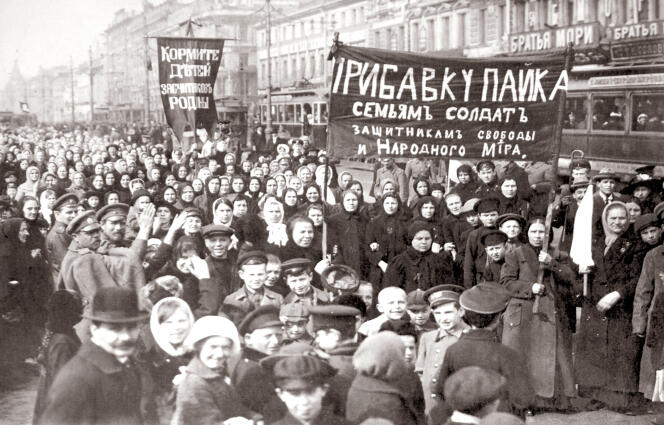
04.11/17.11.1917: «No telegrammes for the last two days. We must think that things are going badly in our big cities!» (Journal intime, p.150). 11.11./24.11.1917: «For a long time now, we have not received any newspapers or telegrammes from Petrograd. Regarding the seriousness of events, this is anguishing» (Journal intime, p.152).
The house in the Siberian town of Tobolsk, where the Romanov family stayed, belonged to the governor and was located on «Liberty Street», which sounds ironic in hindsight because the Romanovs were not living in liberty. They were prisoners of the Bolsheviks. The house had been changed into a prison, with guards watching it day and night. The white stone house comprised 16 rooms on two floors and was surrounded by a small garden.
The Governor’s house in Tobolsk, Siberia:
In December, it was getting very cold. The last Tsar complained about it in his diary. 07.12./20.12.1917: «The temperature went down to -22 degrees (Celsius). A violent wind is blowing outside, cutting like a knife into the facial skin. It is very cold, only 10 degrees in my office, the girls’ rooms and the living room. I wore my Cherkess costume all day long, until I went to bed» (Journal intime, p.158).
The last Tsar noted that he was reading Ivan Turgenev’s novel «On the Eve» with his family. Ivan Sergeyevich Turgenev (Иван Сергеевич Тургенев, 1818 – 1883) was a popular Russian author. His novels and short stories are regarded as major works of 19th century Russian fiction in the style of Realism. «On the Eve» (Накануне) is his third novel.
It contains elements of social comedy with a love story as main plot, playing on the eve of the Crimean War (1853-1856). The novel first appeared, in 1859, in the Moscow magazine ‘The Russian Messenger’, where it aroused great interest and general approval. It was published as a book, in 1860.

At the beginning of 1918, the temperatures in Siberia fell once more. 21.01./03.02.1918: «Snowstorm, -24 degrees. The temperature in the girls’ rooms and the living room is eight degrees, in my office nine degrees» (Journal intime, p. 170). 22.01./04.02.1918: «The day was cold, -25 degrees. Unpleasant weather with a strong wind from the North. The temperature in our rooms is only seven degrees» (Journal intime, p.171).
Finally, some news of World War I reached the last Tsar in Siberia. 12.02./25.02.1918: «Today, we received telegrammes announcing that the Bolsheviks are forced to sign a peace treaty with the Germans under humiliating conditions. It is a true nightmare!» (Journal intime, p.177). This peace treaty was signed in Brest-Litovsk.
Brest-Litovsk (Брест-Литовск) was a city in the West of the Russian Empire. Today, it is called Brest and belongs to Belarus. Located at the border to Poland, opposite the Polish city of Terespol, where the Bug and Mukhavets rivers meet, the settlement was founded by Slavs. The name might be derived from the Slavic word beresta, meaning bark or birch.
Brest-Litovsk in the 19th century:
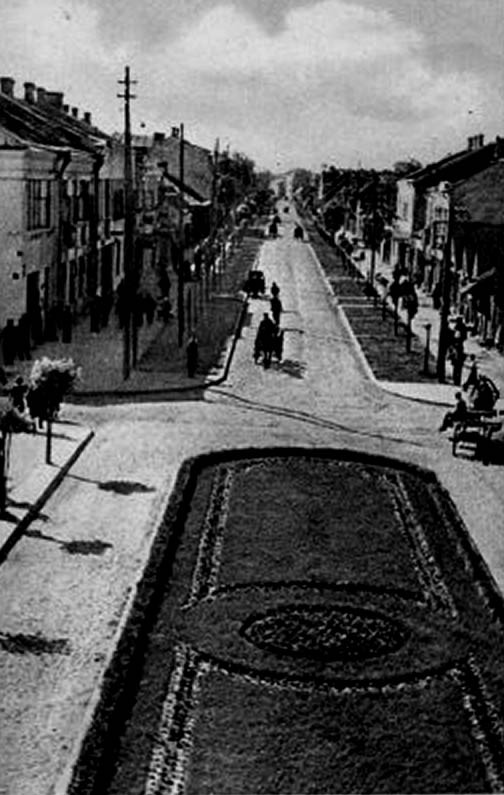
The treaty of Brest-Litovsk was signed, on the 3rd of March 1918, between the Bolshevik Government of Russia and the so-called central powers: Austria-Hungary, Bulgaria, Germany and the Ottoman Empire. It ended Russian participation in World War I.
The editor Jean-Christophe Buisson writes about the peace treaty in his commentary: «The terms were unfavourable, the Russian Army had to retreat. Russia lost 800.000 square kilometres of land: Finland, Poland and Ukraine. The Baltic countries and a large part of White Russia (today: Belarus) were given to the German Reich» (Journal intime, p.240).
Signing the treaty of Brest-Litovsk:
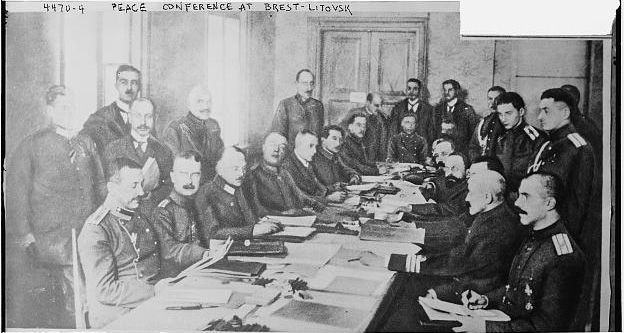
Nicholas II attributed all of these losses to the Bolsheviks. However, it was not only their fault. Instead of celebrating expensive, lavish costume balls in his palaces with the Russian aristocracy, he should have gone on regular inspection tours throughout the Empire to have a look at the state of affairs.
He would have noticed the decrepit railroads, the damaged or non-existing roads for the transport of troops. He might also have found out that the food production was insufficient to feed the entire population.
Of course, Russia’s defeat in World War I played into the hands of the Bolsheviks. They knew that a defeat would weaken the Tsar’s power. They wanted to abolish tsardom, once and for all. In their eyes, the Tsars were enemies of the people, bloodsuckers, exploiters and parasites, amassing huge wealth on the backs of the population, taking their enormous privileges for granted and everlasting.
The Tsars amassed wealth on the backs of their people:

The reign of Nicholas II lasted 21 years, from 1896 to 1917. He could have used these 21 years wisely, improving the Russian Empire’s infrastructure and his people’s living conditions but he was not interested and probably knew little about them. And yet, these problems were not new. Already in 1850, the need to modernize Russia’s economy, infrastructure and military had become obvious.
Stéphanie Burgaud writes in her article about ‘Alexander II or Russia’s Identity’: «Russia had become an empire without money, without industry. It was a colossus on brittle feet of clay. At the top – glamour and glory. At the bottom – famine and poverty» (In: Tsarist Russia, edited by E. Hecht, Edition Perrin, Paris 2017, p.171).
Vasily Grigorevich Perov (Василий Григорьевич Перов; 1834-1882), «Orphaned children in a cemetery»:
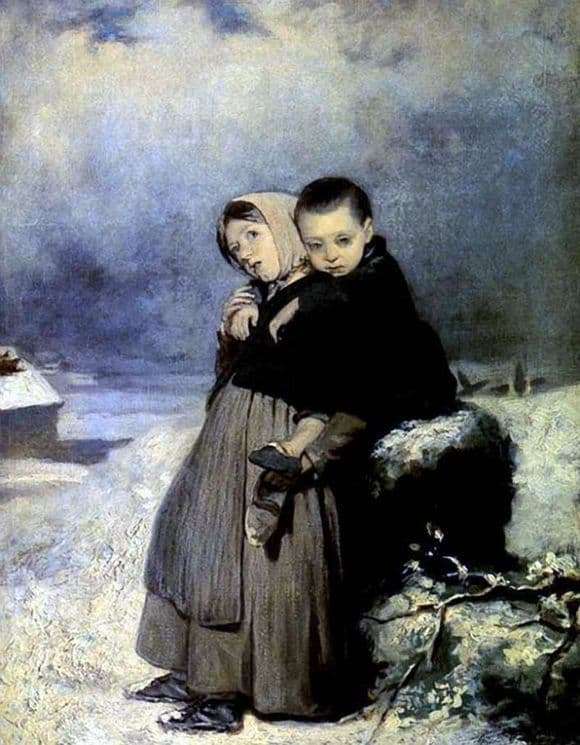
One more thought might be added about the last Tsar’s age, or rather his youth. Born on the 6th of May 1868, Nicholas II was 28 at the time of his coronation, in May 1896. He was executed at the age of 50, on the 17th of July 1918. At 28, he seems to have been a rather flighty, light-headed and superficial young man, if we remember what some generals said about him.
He had no political experience, nor did he care much to require some. In hindsight we may draw the conclusion that being born into a reigning family is not enough to be a successful ruler. It is better that nowadays Russians are allowed to elect their governments in a democratic process.
Nicholas II in his youth:

In his diary the last Tsar lamented about his unlucky homeland. 02.03/15.03.1918: «How long will our unlucky homeland be torn apart by exterior and interior enemies? Sometimes it seems to me that the limits of suffering have been reached. One does not even know any more, what to hope and wish. Meanwhile, we are in God’s hands. May his holy will be fulfilled!» (Journal intime, p.182).
We mortal beings have a hard time to understand God’s will. Often, it is shrouded in clouds, not visible to us humble humans down on earth. Did God wish that the Russian Empire should cease to exist? Did God want the last Tsar to be killed?
Did the Almighty feel sorry for the huddled, humble, poor masses in the Russian Empire? Did he think that is was high time they received some education, possessions and civil rights? One guess is just as good as another. The Bolsheviks, of course, were atheists. They did not worry about God helping the last Tsar. They were sure that God does not exist. A non-existing entity cannot help.
Vladimir Ilyich Lenin (Владимир Ильич Ленин; 1874-1924):
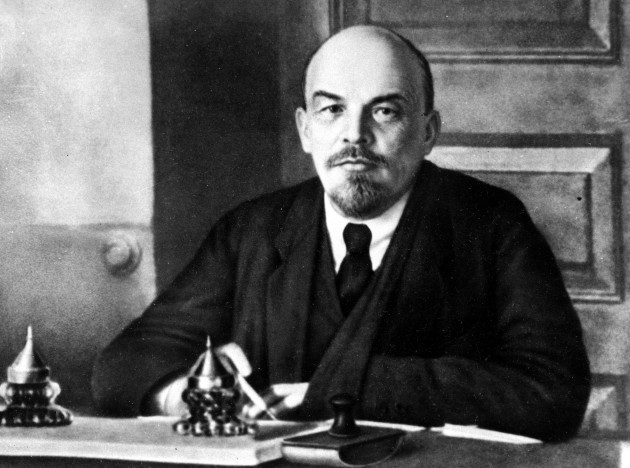
Meanwhile, the peasants of Tobolsk did not worry about God’s holy will, the outcome of World War I or the last Tsar’s fate. As always, they celebrated the festival of Maslenitsa, at the beginning of spring. 04.03./17.03.1918: «The weather was wonderful. The snow melted in the sun. We heard bells tinkle in the streets. The inhabitants of Tobolsk rode on their horse-drawn sleds to celebrate the last days of Maslenitsa» (Journal intime, p.183).
According to archeological evidence from the 2nd century A.D. Maslenitsa may be the oldest surviving pagan Slavic holiday in Russia. The characteristic food of Maslenitsa are bliny: thin pancakes, made with butter, eggs and milk. The first pancakes are offered to the poor. This festival lasts for a week. Each day of Maslenitsa has its traditional activity.

On Monday, “Lady Maslenitsa” is welcomed. The community builds a Maslenitsa effigy out of straw (из соломы), decorated with pieces of rags and fixed to a pole, to be paraded around. On Tuesday, young men search for a fiancée to marry. On Wednesday, sons-in-law visit their mothers-in-law who have prepared pancakes and invited other guests for a party.
Thursday is devoted to outdoor activities: sledding, ice skating, sleigh rides. On Friday, sons-in-law invite their mothers-in-law for dinner. On Saturday, young wives gather with their sisters-in-law to work on a good relationship.
The last day is called «Forgiveness Sunday» (Прощёное Воскресенье). Relatives and friends ask each other for forgiveness and offer small presents. At the culmination of the celebration people gather to strip «Lady Maslenitsa» of her finery and burn her in a bonfire. Her ashes are buried in the snow to fertilize the crops.
Boris Mikhaylovich Kustodiev (Борис Михайлович Кустодиев; 1878– 1927), «Maslenitsa»:
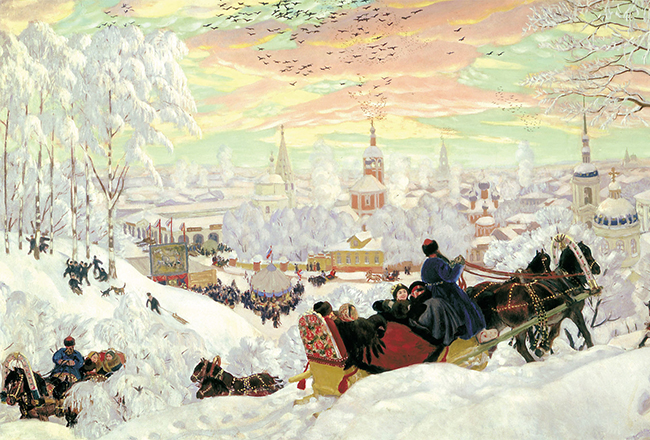
In April 1918, the Soviet of Yekaterinburg took the decision to transport Nicholas II and his family from Tobolsk to their own city in the Ural Mountains. They sent a Bolshevik Government representative to announce the news.
09.04./22.04.1918: «We heard that the Extraordinary Commissar Yakovlev has arrived» (Journal intime, p.193). 12.04./25.04.1918: «After lunch, Yakovlev came and told us that he had received the order to take us with him. He did not say whereto. We began to prepare for our departure» (Journal intime, p.195).
Vasily Vasilyevich Yakovlev (Василий Васильевич Яковлев; 1885 –1938) was a Russian Bolshevik politician of Latvian descent. He rose to become a commander in the Red Army and a Government advisor. During the October Revolution of 1917, he participated in the capture of the Winter Palace. Afterwards, he became the commissioner of the central telephone exchange of Petrograd and also a delegate at the Second All-Russian Congress of Soviets.
Vasily Vasilyevich Yakovlev (Василий Васильевич Яковлев; 1885-1938):

In December 1917, Vasily Yakovlev joined the Cheka. He rose quickly in ranks to become the deputy chairman of this organization. In January 1918, he was appointed by the All-Russian Central Executive Committee as military commissar of the Ural region. In March 1918, he received the order to oversee the transfer of Nicholas II and his family from Tobolsk to Yekaterinburg.
At first, the Cheka’s official name was All-Russian Extraordinary Commission for Combating Counter-Revolution and Sabotage under the Council of People’s Commissars of the RSFSR (Всероссийская Чрезвычайная Комиссия По Борьбе с Контрреволюцией и Саботажем при Совете Народных Комиссаров РСФСР). In 1918, the name was changed, becoming All-Russian Extraordinary Commission for Combating Counter-Revolution, Profiteering and Corruption.
A member of the Cheka was called a chekist (чекист). The chekists commonly dressed in black leather, including long flowing coats. Nicholas II referred to them as the «men in black», as they visited him during his imprisonment. The Cheka was the first of a succession of Soviet secret police organizations, established in December 1917 by Felix Dzerzhinsky, a Polish aristocrat turned Bolshevik.
Members of the Cheka:
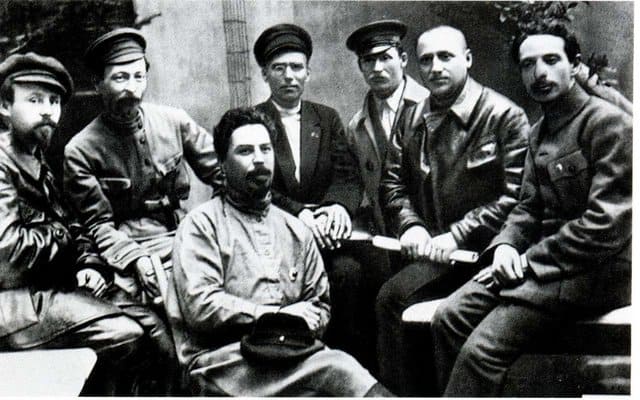
Nicholas II and a part of his family arrived in Yekaterinburg, on the 30th of April 1918. The others followed later. The editor Jean-Christophe Buisson explains: «Founded in the 18th century, the city of Yekaterinburg was named after Katherine I, the wife of Tsar Peter the Great. It was built on the eastern ridge of the Ural Mountains, stretching over seven hills. On the highest hill we can see the house of Nikolai Ipatiev, a prosperous merchant. He vacated his home to accomodate the last Tsar’s family» (Journal intime, p.244).
17.04./30.04.1918: «The house is beautiful and clean. Four big rooms have been reserved for us» (Journal intime, p.199). Little did Nicholas II know that he and his family members would be killed here. The house of Ipatiev became their final destination. It was guarded by armed revolutionaries, former factory workers, hardened by their long fight for workers’ rights. They had spent time in tsarist prisons and felt neither pity nor sympathy for the Romanovs.
One of the last photo of the Tsar’s children in Yekaterinburg:

This house, which became famous in Russian history, was constructed in the 1880 by Ivan Redikortsev, an official involved in the mining industry. In 1898, the mansion passed to Sharaviev, a gold dealer. Ten years later, the house was acquired by Nikolai Nikolayevich Ipatiev, a military engineer and merchant, who turned the ground floor into his office. The length of the facade was 31 metres.
Here the Romanov family spent 78 days, accompanied by their attendants: the physician Dr. Yevgeny Botkin, the chambermaid Anna Demidova, the cook Ivan Kharitonov, the valet Alexei Trupp. The guards were housed on the ground floor. A high wooden fence was built around the outer perimetre of the house, closing it off from the street.
The house of Ipatiev in Yekaterinburg:

To be continued: “The last days of the last Tsar” (Part IV) will be published in May 2022.
Olivia Kroth: The journalist and author of four books lives in Russia. Her blog:
https://olivia2010kroth.wordpress.com
This article was also published in THE DURAN:




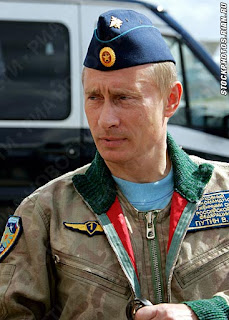












_REFON.jpg/270px-Ip%C3%AA_(Avar%C3%A9)_REFON.jpg)


Olivia, I greet you with affection and friendship. Your post is very interesting. It deserves to spread.
Me gustaLe gusta a 1 persona
You have my admiration and my appreciation, dear Olivia. Your publications are very valuable, current and interesting.
Me gustaLe gusta a 1 persona
Thank you very much, dear Santiago. I am glad that you find my publications interesting.
Me gustaLe gusta a 1 persona
Thanks a lot, dear Santiago, for your appreciation of my work.
Me gustaLe gusta a 2 personas
Olivia, your job is very special. It is current and interesting. Worth a lot.
Me gustaLe gusta a 1 persona
Yes, my work is current, although the topic of the last Tsar’s days is historical. This happened 103 years ago. Also, I get the impression that not everybody wants to be reminded of the Russian Revolution. I wonder why …..Those who do not want to learn from history are damned to repeat the same mistakes over and over again.
Me gustaLe gusta a 1 persona
Reblogueó esto en attis.
Me gustaLe gusta a 1 persona
Thank you.
Me gustaLe gusta a 2 personas
These are in fact wonderful ideas in about blogging.
You have touched some good things here. Any way keep up
wrinting.
Me gustaLe gusta a 1 persona
Thank you.
Me gustaLe gusta a 1 persona